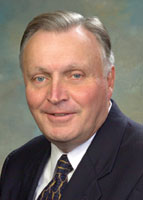2009 CEOs Who 'Get It'
 James H. Miller
James H. Miller
Chairman, President & CEO
PPL Corp.
PPL Corp. controls more than 11,000 megawatts of generating capacity in the United States, sells energy in key U.S. markets, and delivers electricity to about 4 million customers in Pennsylvania and the United Kingdom. The Allentown, PA-based corporation employs 11,000 workers.
Why is safety a core value at your company?
Our electricity generation and delivery businesses, in particular, place employees in risky and challenging situations on an everyday basis. When your employees work around high-voltage electricity, operate a nuclear generating plant or climb utility poles in snowstorms in the middle of the night, safety is not an option. It has to be part of your core values – part of your DNA, even. We recognize and emphasize training, preparation and safety foremost in every area of our business.
How do you instill a sense of safety in your employees on an ongoing basis?
We have a vibrant safety communication program that includes a weekly company-wide newsletter, bulletin board postings, intranet articles, talking points for supervisors to use with their staffs, and a series of 15-minute safety videos made exclusively for PPL. On internal surveys, more than 95 percent of PPL employees indicated they are aware of the importance of working safely at all times. That’s a sign our safety messages are hitting home.
Of course, we have an extensive safety training program and expect all employees to remain current on their requirements. When we have urgent safety messages to deliver, we call company-wide stand-downs in which all employees stop work and focus on the topic at hand. And our generation operations hold a well-attended annual safety forum where employees from all of our power plants share best practices.
We also encourage employees to watch out for one another – to “be their brothers’ and sisters’ keepers,” as we put it. We consider it part of the employees’ responsibilities to speak up if they see a potential safety hazard on the job or observe a co-worker acting in an unsafe fashion. That’s a great safety tool because the message isn’t just coming from the company: It’s coming from a peer, a colleague, a person who shares your duties and goals. Employees make powerful ambassadors.
What is the biggest obstacle to safety in your workplace, and how do you work to overcome it?
In one word: focus. Many of our employees have decades of experience, which is a major plus in terms of institutional memory. But sometimes there’s a risk of doing a job on “autopilot” when you have been doing it for 25 or 30 years. And, in our business, inattention to detail can hurt an employee or a member of the public.
Our safety communications emphasize the message of staying focused and analyzing every job for safety hazards before starting. We stress taking care of details, such as inspecting equipment before each use. We find that lack of attention to detail is a leading cause of safety incidents at PPL, and we constantly work to raise employees’ awareness and eliminate those incidents that come from not staying focused.
How does safety “pay” at your company?
We operate in a critical industry. Twenty-four hours a day, seven days a week, people rely on us to produce and distribute electricity. A strong safety program that reduces accidents and incidents and keeps our valued and knowledgeable employees on the job makes it easier for us to fulfill our crucial responsibilities to our customers.
Our commitment to safety has also earned PPL Voluntary Protection Program Star status at more than a dozen of our facilities, which serves as public confirmation that PPL’s safety programs rank with the best. That kind of credential helps us attract strong prospective employees who recognize that PPL cares about keeping its people safe.
Post a comment to this article
Safety+Health welcomes comments that promote respectful dialogue. Please stay on topic. Comments that contain personal attacks, profanity or abusive language – or those aggressively promoting products or services – will be removed. We reserve the right to determine which comments violate our comment policy. (Anonymous comments are welcome; merely skip the “name” field in the comment box. An email address is required but will not be included with your comment.)

